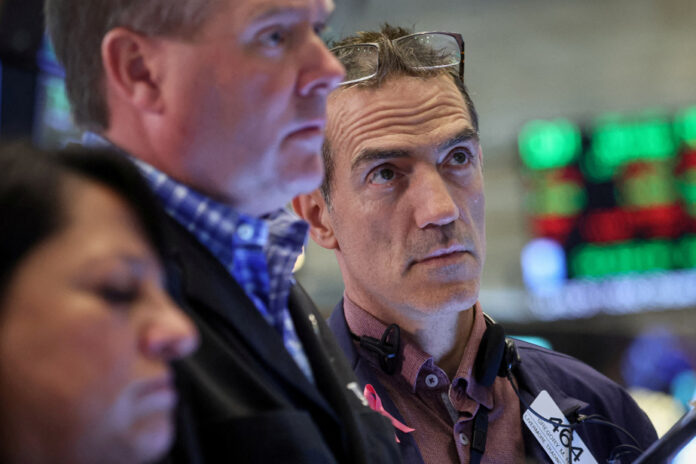(New York) The New York Stock Exchange ended sharply lower on Tuesday, driven by a movement of risk aversion linked to the accumulation of dark clouds over the global economy, from high bond rates to oil prices.
The Dow Jones lost 1.14%, the NASDAQ dropped 1.57% and the broader S
Since the beginning of the week, Wall Street has been worried that the US central bank will go too far in its monetary tightening and “break something”, causing major disruptions in the markets and within the economy, according to Art Hogan , from B. Riley Wealth Management.
For several days, the New York market has been observing, fascinated, the irresistible rise in bond rates.
The yield on 10-year U.S. government bonds rose to 4.56%, the first time in almost 16 years. As traders buy into the assumption of high interest rates for a long time, yields on longer maturities soar.
The yield at 30 years thus rose to 4.69%, an altitude that it had not been at for more than 11 years.
“There was no major news today, but the market is reacting before it hurts,” commented Kim Forrest of Bokeh Capital Partners.
Illustration of a strong increase in tension among investors, the VIX index, which measures the nervousness of Wall Street, jumped almost 12%, to its highest level in four months.
For Kim Forrest, the New York Stock Exchange is overreacting, while macroeconomic indicators remain strong, even if they are slowing down.
“We are approaching earnings season and I have not seen any indication that companies are going to miss their targets,” argues the manager. “Nothing terrible seems on the horizon, but the market is selling because it is afraid that it will not be given the numbers it expects. »
On the stock market, Amazon (-4.03%) suffered from the announcement of legal action brought by the American Competition Authority, the FTC, against the group from Seattle (Washington State) for abuse of dominant position on its online commerce platform.
Prosecutors from some 17 states have joined the lawsuit, which accuses Amazon of taking advantage of their hegemony to impose anticompetitive conditions on merchants who use the platform.
Although it was the most targeted, Amazon was not the only giant technological capitalization to suffer the withdrawal of investors, like Apple (-2.34%), Microsoft (-1.70%) or Alphabet (-2.06%).
The three major American manufacturers are increasingly penalized as the strike launched by the UAW (United Auto Workers) union continues.
Stellantis (-2.08%), Ford (-1.19%) and General Motors (-2.42%) all ended up clearly in the red.
Electric vehicle manufacturer Rivian (5.35%) was driven by a positive analyst note from Baird, which reported sustained demand for its models, while the market had expressed doubts.
The cosmetics group Coty (-1.78%) for its part paid for the announcement on Monday of the issue of 33 million new shares, in conjunction with its upcoming listing on the Paris Stock Exchange.
This dual listing (with New York) should allow Coty to diversify its shareholder base. The proceeds from the capital increase will be dedicated to repaying its debt.















